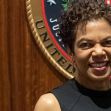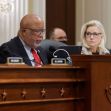A unanimous ruling from a three-judge panel upheld a prior, lower court’s decision that former President Trump’s White House records can be shared with the January 6 Capitol riot committee. The federal D.C. Circuit Court of Appeals denied Trump’s bid to stop the release of sections of his White House records to the House committee.
The Committee will receive the materials in an accelerated timeline, in thirty days. Trump’s attorneys now have fourteen days to appeal the decision to the Supreme Court and have said they plan to file the appeal shortly.
In her statement about the unanimous ruling, Judge Patricia Millett said they found no reason to withhold the records from the House committee investigating the January 6 Capitol Hill insurrection, and that these White House files are important due to the investigation into the national insurrection on Capitol Hill.
The Democrat-led committee requested some of Trump’s White House records to review concerning his actions on January 6, before and during the Capitol Hill riots.
To the shouts of the crowd yelling “Fight for Trump,” the former president told his supporters to fight back, to “walk down to the Capitol” as he accused Democrats of faking the election results, and that they “rigged it like they have never rigged an election before.”
At the event leading up to the Capitol Hill riot, Trump repeatedly told the crowd the election had been stolen from him, using imaginary numbers about “fake” election results. Peppered with violent imagery, Trump urged his supporters to act.
“All of us here today do not want to see our election victory stolen by a bold and radical left Democrats which is what they are doing and stolen by the fake news media,” said Trump at the rally. “That is what they have done and what they are doing. We will never give up. We will never concede. It doesn't happen. You don't concede when there's theft involved. Our country has had enough. We will not take it anymore, and that is what this is all about.”
After spouting imaginary numbers about numerous states’ voting results, Trump then told the angry crowd to walk to the Capitol, “because you'll never take back our country with weakness. You have to show strength and you have to be strong.”
Immediately after the Trump “Save America Rally” on January 6, where Trump told the crowd to “Stop the Steal” of the presidential election results, the protesters morphed into a violent melee, and MAGA supporters marched directly to the Capitol, where Congress had to be evacuated for their safety.
The three-judge panel stated their decision to allow the release of Trump’s White House records is necessary due to national interest pertaining to the fatal attack on the Capitol on January 6.
“On the record before us, former President Trump has provided no basis for this court to override President Biden's judgment and the agreement and accommodations worked out between the Political Branches over these documents,” noted Judge Millet. “Both Branches agree that there is a unique legislative need for these documents and that they are directly relevant to the Committee's inquiry into an attack on the Legislative Branch and its constitutional role in the peaceful transfer of power.”
The Select Committee’s panelists including panel Chair Bennie Thompson, D-Miss., and Vice-Chair Liz Cheney, R-Wyo, said they were happy the courts denied Trump’s request not to share the records.
"We applaud the Court's decisive ruling, which respects the Select Committee's interest in obtaining White House records and the President's judgment in allowing those records to be produced," said Thompson and Cheney in a statement. ”Our work moves ahead swiftly. We will get to the truth.”
Initially, the House committee asked the National Archives for Trump’s White House records, since that organization safeguards presidential records. At that time, President Joe Biden waived any executive privilege regarding Trump’s records, including his calendar, schedules, and communications, due to the investigation into the fatal Capitol insurrection on January 6.
Trump argued President Biden should not have waived his executive privilege and then sued to block the committee from getting his records. When a district court judge denied Trump, his attorneys immediately appealed to the D.C. Circuit Court, which has also ruled against him.
Biden said his decision to override Trump’s request to block the release of his White House records was critical to the national interest, regarding the Capitol Hill riots that resulted in numerous fatalities and threatened the Democratic process validating the legal results of the presidential election and peaceful transfer of power.
Judge Millet, in her written decision, said Biden built a "carefully reasoned" argument for allowing Trump’s White House records to be shared with the House committee.
"The central question in this case is whether, despite the exceptional and imperative circumstances underlying the Committee's request and President Biden's decision, a federal court can, at the former President's behest, override President Biden's decision not to invoke privilege and prevent his release to Congress of documents in his possession that he deems to be needed for a critical legislative inquiry," Millett wrote in her opinion.
The court also stated they saw no harm to Trump if these particular records are released to the House committee.
"Former President Trump likewise has failed to establish irreparable harm, and the balance of interests and equities weigh decisively in favor of disclosure," the court papers noted.
Trump’s statements to the crowd at his “Save America Rally” preceding the angry mob’s march to the Capitol that resulted in violence and numerous fatalities were captured by social media, video and television news.
Like a wartime general inspiring his soldiers, the former president urged his supporters at the rally to take action against the “steal” of an election and an “illegitimate president.”
“We will never give up,” Trump said. “We will never concede. It doesn’t happen. You don’t concede when there’s theft involved. Our country has had enough. We will not take it anymore, and that is what this is all about. And to use a favorite term that all of you people really came up with, we will stop the steal. You will have an illegitimate president. That is what you will have, and we can’t let that happen. These are the facts that you won’t hear from the fake news media. It’s all part of the suppression effort. They don’t want to talk about it. They don’t want to talk about it. We fight like hell, and if you don’t fight like hell, you’re not going to have a country anymore.”
Following his speech at the rally that led to the violent incursion at the Capitol, then-President Trump told reporters, “If you read my speech — many people have done it, and I have seen it in the papers and the media, on television. It has been analyzed, and people thought that what I said was totally appropriate.”
Trump’s attorneys have said they will take their appeal of the new unanimous decision of the D.C. Circuit Court of Appeals to the Supreme Court.






